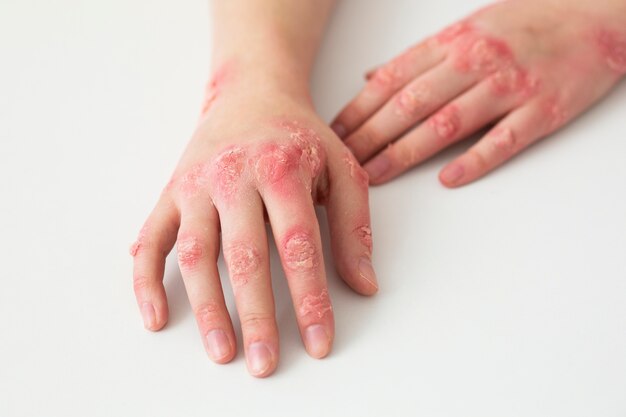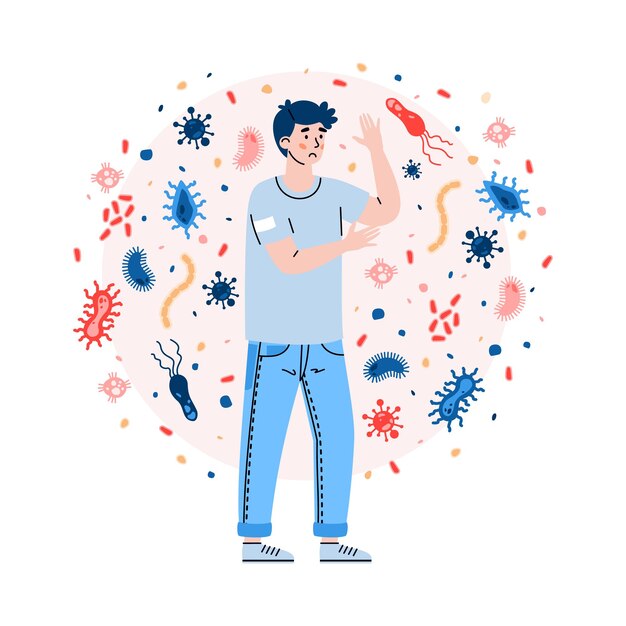Zinc (Zn), the trace element that supports the normal growth and development along with other immune functions of the body is concentrated about 60% in skeletal muscle and 30% in bones. Though Zn deficiency is uncommon, it typically precipitates due to restricted absorption particularly in people with gastrointestinal (GI) disorders or dietary inadequacy. Non vegetarian food is more readily absorbed than plant based food. Thus, vegans are more at risk of developing the zinc deficiency symptoms i.e. eczema, alopecia, poor immunity, prolonged wound healing, ageusia, diarrhea, eye problems etc.
Following is a list of symptoms to identify if you are zinc deficient.
Symptoms of zinc deficiency:
1. Skin lesions / Eczema:
Zinc, through its role in collagen synthesis nourishes the skin and makes it young and lively. It is also effective in the prevention of acne, inflammation and scarring. Infact, Zn oxide is used as a component of sunblock to shield against the ultraviolet radiations. The shortfall of this vitamin in the body can thus lead to dry, scaly, eczematous patches which may become desquamative or psoriasiform plaques. Supplementation may improve the symptoms by slowly replacing the worn out epithelium with the new one.

2. Weakened immunity:
In the absence of Zn, the production and development of T and B lymphocytes is compromised and antibodies such as immunoglobulins are not generated. Therefore, immune dysfunction inculcate poor wound healing, improper blood clotting, frequent colds, inflammatory effects and an increased susceptibility to pathogens. Alopecia or the loss of hair is a manifestation of weakened immunity that attacks on the hair follicles.

3. Ageusia:
Ageusia or loss of taste sensation is due to diminished availability of the salivary protein, Gustin that contains Zn. The growth and development of taste buds become abnormal in the absence of gustin and the effective functioning of taste buds is impaired. The mineral has other important roles in oral cavity that include maintenance of dental health and reduction of bad breath (halitosis) from mouth.

4. Affected vision:
Conservation of normal ocular function involves the part of this essential micronutrient that protects the eyes from macular degeneration. The melanin production in the eye is aided by Zn to protect against the harmful ultraviolet radiations. The visual cycle that helps adapt to dark environment requires its contribution. Thus, low vitamin A level in blood, the necessary component of visual cycle, is a direct indicator of Zn shortage. The vision problems associated with such condition include night blindness, central scotoma, macular degeneration, loss of contrast sensitivity and vision loss.
5. Developmental delays:
Zinc during pregnancy is vital for the reduction of preterm births and hence, low birth weight of babies. The deficiency results in fetal malformations and abnormal brain development of fetus. Spermatogenesis, maturation of oocyte and fertilization is also impaired subject to the mineral deficiency. Thus, Zn has an important role in both fertility and intrauterine growth.

Vulnerable groups to zinc deficiency:
- Vegans as body can absorb this mineral from animal sources more readily. In plant based dietary sources of zinc, the presence of phytates limits the zinc absorption by binding with it.
- People with chronic diseases especially gastrointestinal diseases such as celiac disease, pancreatic disease, ulcerative colitis etc.
- Patients diagnosed with chronic kidney disease (CKD) who take thiazide diuretics i.e. chlorthalidone which increases the urinary loss of zinc.
- Infants over 6 months of age but solely relying on breast milk for nutrition.
- Pregnant women as zinc is readily used for the nutrition of developing fetus during pregnancy.
Dietary sources of zinc:
- Beans, nuts and cereals
- cheese, milk, yoghurt
- Beef, oysters and shellfish
- chickpeas and oatmeal
Recommended Daily Allowance:
- Adults : 15 mg/day
- Children: 10 mg/day
- Pregnant and lactating women: 15–20 mg/day are the recommended amounts.
Iron is supplemented with zinc during pregnancy. It is due the ability of Zn to promote iron absorption and thus the combined effect of Fe and Zn is the prevention of anemia. Infants up to six months are nourished with zinc supplies through maternal milk and thus do not require any other source.
ACRODERMATITIS ENTEROPATHICA:
Diagnosis and treatment of zinc deficiency:
Diagnosis involves a blood test or a urine test that indicates low zinc levels. However, a detailed medical history is essential as it is only a small constituent of the body. Treatment options include dietary intake of Zn rich foods or multivitamin supplements.
Disclaimer: This article is directed to serve the sole purpose of providing knowledge. Any relatable condition or symptom must be checked by a physician for proper diagnosis before opting medication.